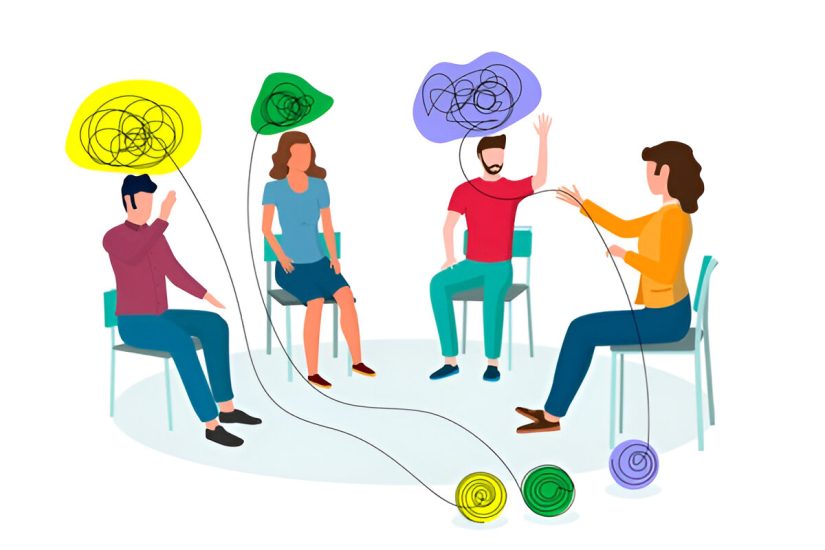- August 18, 2025
- by Harshita Bajaj
- Therapy
Often times, you may feel overwhelmed or stuck by your emotions or behavioral patterns. If you can relate to this, you are not alone. Many people experience intense, overwhelming feelings, discord and interpersonal challenges that can disrupt their work, relationships and daily life. Dialectical Behavior Therapy (DBT) is a therapeutic approach that focuses on teaching essential life skills to manage such challenges.
What is Dialectical Behavior Therapy (DBT)?
Dialectical Behavior Therapy or DBT is a form of psychotherapy, specifically an adaptation of Cognitive Behavior Therapy (CBT) that combines core principles of CBT with mindfulness and acceptance strategies.
Did you know DBT was originally developed for the treatment of individuals with borderline personality disorder? Now, it is used for a wide range of mental health challenges such as depression, anxiety, eating disorders, substance use disorders and also trauma-related difficulties.
“Dialectical” means synthesizing opposites. In DBT, the central dialectic is between acceptance and change. Hence, DBT works towards combining two main ideas, acceptance and change. Its main aim is to help you accept yourself while working towards positive growth, and adopting healthy coping mechanisms.
Dialectical Behavior Therapy Techniques
DBT works on four major areas or skill sets on the basis of which techniques are taught to the client:
• Mindfulness-based techniques that help you focus on the present moment, increase self-awareness and insights without judgment
• Emotion regulation building techniques, which help you identify and label emotions, replace unhealthy coping mechanisms with healthier alternatives
• Techniques for distress tolerance that help you handle crisis situations and intense or overwhelming emotions and build emotional resilience
• Interpersonal effectiveness techniques that help you improve your relationships, communications and setting healthy boundaries
Stages of DBT
DBT is structured in the following stages typically:
1. Initial Stage: DBT herein focuses on safety building and reducing any life-threatening behaviors or self-destructive behaviors, if present
2. Skill Training: Herein, DBT would help you build the necessary coping skills to manage distress
3. Emotion Regulation: DBT would then address any specific emotional vulnerabilities and help you reduce emotional intensity and build healthy coping mechanisms
4. Deeper meaning and fulfilment: DBT would help you in achieving set life goals, cultivate joy and purpose in your life
Why DBT works?
According to research, DBT has significantly reduced self-harm and suicidal behavior; improved emotional dysregulation and mood instability in borderline personality disorder patients; improved depressive symptoms, impulsivity; improved attention, memory, planning and hospitalization in various mental health conditions.
DBT has worked so well with many individuals because it has a practical and skills-based approach. DBT helps you learn that it’s possible to accept your current situation and at the same time, strive towards a meaningful life. It uses practice for building necessary skills such as role-play, homework, and real life situations.
DBT as Treatment for Borderline Personality Disorder
DBT was developed originally in the late 20th century by Dr. Marsha Linehan for people with borderline personality disorder (BPD). It was designed to help individuals with BPD who struggle with emotional dysregulation and mood instability. It has proven to be effective in treatment of BPD individuals as it helps build many healthy coping mechanisms, emotional regulation skills and moreover, it specifically helps them in reducing self-harm and/or suicide attempts and impulsivity.
DBT is administered by a therapist or psychologist with specialized training for DBT, if you or someone you know may benefit from taking DBT, search for therapist near me, DBT psychologist near me to help you find the appropriate support and treatment needed.
A note to remember, if you or a loved one is struggling with emotional dysregulation, impulsivity, self-harm or psychological distress, consult a DBT-trained professional to help build the necessary skills, overcome crisis and improve relationships. At North America Behavorial Health Services, we are committed to providing you access to therapy and resources that work for you. Our experts will connect you with trained mental health professionals who can deliver top-notch dialectical behavior therapy that works for you!
Don’t forget, support is available.
















